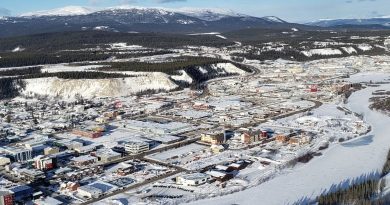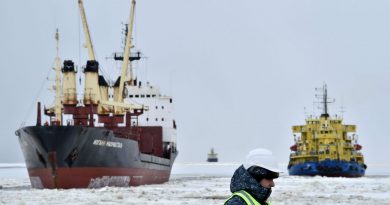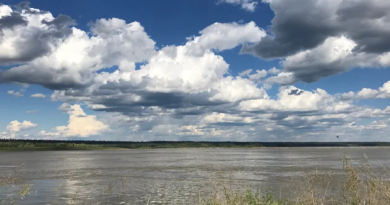Overview: Trump–Putin summit in Alaska draws close watch from Arctic leaders over Ukraine, security stakes

The Trump–Putin summit in Alaska on Aug. 15 is drawing close attention from Arctic capitals, where leaders see the talks as a test of both Ukraine’s future and the stability of their own northern regions.
Russian President Vladimir Putin’s presence in the U.S.’s northernmost state — itself a strategic Arctic hub — comes as the war he launched in Ukraine continues to reshape northern politics.
The conflict has already upended Arctic cooperation, disrupted the Arctic Council’s work and strained ties in a region once seen as insulated from geopolitical crises.
Message from Nordic countries: peace must be “just”
Arctic Council members Iceland, Finland, Norway, Denmark, Sweden, as part of the Nordic–Baltic Eight, along with Estonia, Latvia, and Lithuania, declared “unwavering support for Ukraine’s sovereignty, independence, and territorial integrity in the face of Russia’s illegal war of aggression,” in a statement this week in advance of the summit.
The countries said they welcomed Trump’s initiative but insisted any peace must be “lasting, just,” and include Kiev.
“No decisions on Ukraine without Ukraine, and no decisions on Europe without Europe,” they said.
Arctic foreign ministers amplify message
The northern foreign ministers have sought to amplify this message in the days leading up to Friday’s meeting.
Canada’s top diplomat Anita Anand, in an August 14 call with her Ukrainian counterpart, said on X that she stressed that Ukraine’s future “must be decided by Ukrainians alone.”
Today I spoke with my Ukrainian counterpart Minister @andrii_sybiha to discuss Canada’s unwavering support for Ukraine. In particular, Ukraine’s future must be decided by Ukrainians alone. Canada stands firmly against any attempt to redraw borders through violence. We will…
— Anita Anand (@AnitaAnandMP) August 14, 2025
Norway’s foreign minister Espen Barth Eide said on August 9 on his account that “a dignified peace must be a lasting and just peace” and reiterated Ukraine’s sovereignty must be respected.
Finland, a country that shares a 1,340-kilometre border with Russia, joined NATO along with Sweden after the Ukraine invasion, has consistently warned that any peace outcome rewarding Russian territorial gains would undermine the international rules‑based order and threaten the security of small states in the region
Finland’s foreign minister Elina Valtonen in an August 11 EU meeting summary, noted early signs of Russian readiness to negotiate — crediting U.S. pressure — but warned that “Ukraine itself will determine the terms it is ready to accept.”
In our meeting of EU foreign ministers this evening we discussed Russia’s war of aggression against Ukraine. The EU continues its intensive dialogue with the United States, Ukraine, and our partners.
Our objective is to bring Russia’s war of aggression to an end and to achieve a…
— Elina Valtonen (@elinavaltonen) August 11, 2025
Implications for North
Northern capitals are watching the summit particularly closely, fearing that if Russia’s aggression is rewarded, the precedent could embolden Moscow elsewhere — including the Arctic, where Putin has expanded military facilities and deepened cooperation with China.
The same rules-based order under challenge in Ukraine underpins sovereignty claims from Svalbard, and even Greenland.

Concerns over northern security have driven a flurry of Arctic diplomacy in recent months: Iceland and France signed a new defense cooperation pact in Reykjavík; Norway’s King Harald traveled to Svalbard to assert sovereignty over the islands and French President Emmanuel Macron visited Greenland to back Danish and Greenlandic leaders amidst rhetoric from Trump about taking control of the island.
Now, northern capitals will be watching Alaska Friday for signs that any Ukraine deal reinforces — rather than weakens — the rules they’ve relied on until now to keep the Arctic stable.
Feedback, story ideas or tips? Contact Eilís at eilis.quinn(at)cbc.ca
Related stories from around the North:
Canada: More soldiers, more money. Canada’s top soldier extols benefits of spending boost, CBC News
Denmark: Denmark to expand Arctic surveillance with purchase of long-range drones, Reuters
Greenland: Europeans step up Arctic diplomacy amid U.S. and global pressure, Eye on the Arctic
Finland: Finland hails plan for allies to join NATO land forces in North, The Independent Barents Observer
Iceland: Europe’s Von der Leyen strengthens Arctic security ties with Iceland during visit, Eye on the Arctic
Norway: Amid Norway’s celebration of Svalbard Treaty comes another verbal attack from Moscow, Reuters
Russia: Russian pilots learn to target long-range drones in Barents Sea combat drill, The Associated Press
Sweden: Europe and the US stand united ahead of Alaska meeting: Swedish PM, Radio Sweden
United States: Trump, Putin arrive for pivotal Alaska summit that could reshape Ukraine war, The Associated Press



